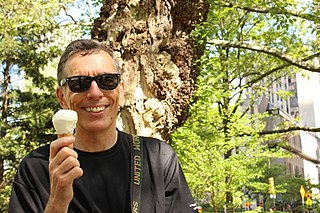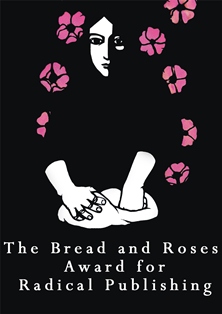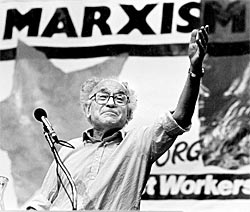Related Research Articles
Paul Mackintosh Foot was a British investigative journalist, political campaigner, author, and long-time member of the Socialist Workers Party (SWP).

Alexander Theodore Callinicos is a Rhodesian-born British political theorist and activist. An adherent of Trotskyism, he is a member of the Central Committee of the Socialist Workers Party (SWP) and serves as its International Secretary. He is also editor of International Socialism, the SWP's theoretical journal, and has published a number of books.
Duncan Hallas, was a prominent member of the Trotskyist movement and a leading member of the Socialist Workers Party in Great Britain.

John Rees is a British political activist, academic, journalist and writer who is a national officer of the Stop the War Coalition, and founding member of Counterfire. He is currently a Visiting Research Fellow at Goldsmiths, University of London.
A people's history, or history from below, is a type of historical narrative which attempts to account for historical events from the perspective of common people rather than leaders. There is an emphasis on disenfranchised, the oppressed, the poor, the nonconformists, and otherwise marginal groups. The authors typically have a Marxist model in mind, as in the approach of the History Workshop movement in Britain in the 1960s.

David McNally is an activist and the NEH Cullen Distinguished Professor of History and Business at the University of Houston. He was previously (1983-2018) a professor of Political Science at York University in Toronto, Ontario, and was chair of the university's Department of Political Science for several years. He is the author of many books and scholarly articles and the winner of the 2012 Deutscher Memorial Award and the 2012 Paul Sweezy Award.
Ian Birchall is a British Marxist historian and translator, a former member of the Socialist Workers Party and author of numerous articles and books, particularly relating to the French Left. Formerly Senior Lecturer in French at Middlesex University, his research interests include the Comintern, the International Working Class, Communism and Trotskyism, France and Syndicalism, Babeuf, Sartre, Victor Serge and Alfred Rosmer. He was on the editorial board of Revolutionary History, a member of the London Socialist Historians Group and has completed a biography of Tony Cliff.
Colin Barker was a British sociologist as well as a Marxist historian and writer. A former long-standing member of the Socialist Workers Party in Manchester, he was the author of numerous articles and works on Marxism, including a history of the Polish trade union Solidarity, Festival of the Oppressed.

Neil Faulkner was a British archaeologist, historian, writer, lecturer, broadcaster, and political activist.
Gluckstein may refer to:

The Bread and Roses Award for Radical Publishing is a British literary award presented for the best radical book published each year, with radical book defined as one that is "informed by socialist, anarchist, environmental, feminist and anti-racist concerns" – in other words, ideologically left books. The award believes itself to be the UK's only left-wing only book prize. Books must be written, or largely written by authors or editors normally living in the UK, or international books available for purchase in the UK. Winning authors receive £1,000. The Bread and Roses Award is sponsored by the Alliance of Radical Booksellers and has no corporate sponsorship.

Chris Harman was a British journalist and political activist, and a member of the Central Committee of the Socialist Workers Party. He was an editor of International Socialism and Socialist Worker.
The Socialist Workers Party (SWP) is a far-left political party in the United Kingdom. Founded as the Socialist Review Group by supporters of Tony Cliff in 1950, it became the International Socialists in 1962 and the SWP in 1977. The party considers itself to be Trotskyist. Cliff and his followers criticised the Soviet Union and its satellites, calling them state capitalist rather than socialist countries.
Jabra Nicola was a Palestinian Arab Israeli Trotskyist leader, the author of numerous articles and pamphlets who also translated some of the classics of Marxism into Arabic. Born in Haifa, he joined the Palestine Communist Party before he turned 20, and was responsible for its publication al-Ittihad.
Chanie Rosenberg was a South African-born artist, former teacher and socialist. She was the sister of Michael Kidron, the partner of Tony Cliff, and a founder member of the Socialist Workers Party in Britain.

Socialist Worker is the name of several newspapers currently or formerly associated with the International Socialist Tendency (IST). It is a weekly newspaper published by the Socialist Workers Party (SWP) in the United Kingdom since 1968, and a monthly published by the International Socialists in Canada. It was a monthly published by the International Socialist Organization (ISO) in the United States from 1977 to 2019, and a biweekly published by the Socialist Workers Party in Ireland, a quarterly published by the International Socialist Organisation in Zimbabwe and a monthly published by the former International Socialist Organisation in Australia. Socialist Worker was also the name of an IST political group in New Zealand.

Tony Cliff was a Trotskyist activist. Born to a Jewish family in Ottoman Palestine, he moved to Britain in 1947 and by the end of the 1950s had assumed the pen name of Tony Cliff. A founding member of the Socialist Review Group, which became the International Socialists and then the Socialist Workers Party, in 1977 Cliff was effectively the leader of all three.
Crisis theory, concerning the causes and consequences of the tendency for the rate of profit to fall in a capitalist system, is associated with Marxian critique of political economy, and was further popularised through Marxist economics.
Bourgeois revolution is a term used in Marxist theory to refer to a social revolution that aims to destroy a feudal system or its vestiges, establish the rule of the bourgeoisie, and create a bourgeois (capitalist) state. In colonised or subjugated countries, bourgeois revolutions often take the form of a war of national independence. The Dutch, English, American, and French revolutions are considered the archetypal bourgeois revolutions, in that they attempted to clear away the remnants of the medieval feudal system, so as to pave the way for the rise of capitalism. The term is usually used in contrast to "proletarian revolution", and is also sometimes called a "bourgeois-democratic revolution".
The Commune Council, simply known as the Commune, was the government during the 72-day Paris Commune in 1871. Following elections on 26 March, the municipal council adopted the formal name Paris Commune in its first session, implying a more revolutionary intent. The council declared itself and its name on 28 March at the Hôtel de Ville as a celebratory event. Their first proclamation followed the next day, reminding citizens of their autonomy and warning of civil war. The Commune was supported by the vast majority of Parisians. The Central Committee of the National Guard recognized and relinquished power to the Commune, but continued to organize as the "guardian of the revolution". The two groups exercised a de facto dual sovereignty.
References
- ↑ "Profile page: Donny Gluckstein". www.press.uchicago.edu. University of Chicago Press. Archived from the original on 3 October 2016. Retrieved 2 October 2016.
- ↑ "Letters page: Guardian". The Guardian . 14 April 2000.
- ↑ "2013 Award page: Bread and Roses". breadandrosesprize.wordpress.com. Bread and Roses Award. 5 March 2013.